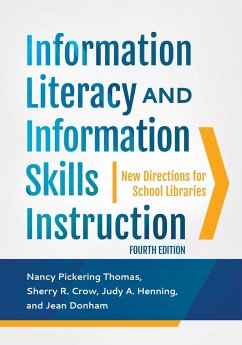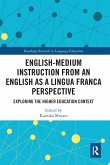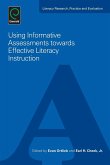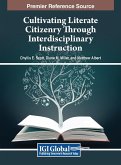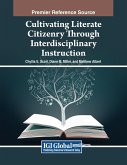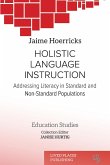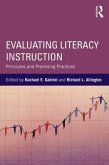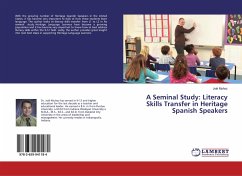Nancy Thomas, Sherry Crow, Judy Henning
Information Literacy and Information Skills Instruction
New Directions for School Libraries
Nancy Thomas, Sherry Crow, Judy Henning
Information Literacy and Information Skills Instruction
New Directions for School Libraries
- Broschiertes Buch
- Merkliste
- Auf die Merkliste
- Bewerten Bewerten
- Teilen
- Produkt teilen
- Produkterinnerung
- Produkterinnerung
Exploring the ways in which today's Internet-savvy young people view and use information to complete school assignments and make sense of everyday life, this new edition provides a review of the literature since 2010. The development of information literacy skills instruction can be traced from its basis in traditional reference services to its current growth as an instructional imperative for school librarians. Reviewing the scholarly research that supports best practices in the 21st-century school library, this book contains insights into improving instruction across content areas-drawn from…mehr
Andere Kunden interessierten sich auch für
![English-Medium Instruction from an English as a Lingua Franca Perspective English-Medium Instruction from an English as a Lingua Franca Perspective]() English-Medium Instruction from an English as a Lingua Franca Perspective75,99 €
English-Medium Instruction from an English as a Lingua Franca Perspective75,99 €![Using Informative Assessments towards Effective Literacy Instruction Using Informative Assessments towards Effective Literacy Instruction]() Using Informative Assessments towards Effective Literacy Instruction138,99 €
Using Informative Assessments towards Effective Literacy Instruction138,99 €![Cultivating Literate Citizenry Through Interdisciplinary Instruction Cultivating Literate Citizenry Through Interdisciplinary Instruction]() Cultivating Literate Citizenry Through Interdisciplinary Instruction254,99 €
Cultivating Literate Citizenry Through Interdisciplinary Instruction254,99 €![Cultivating Literate Citizenry Through Interdisciplinary Instruction Cultivating Literate Citizenry Through Interdisciplinary Instruction]() Cultivating Literate Citizenry Through Interdisciplinary Instruction196,99 €
Cultivating Literate Citizenry Through Interdisciplinary Instruction196,99 €![Holistic Language Instruction Holistic Language Instruction]() Jaime HoerricksHolistic Language Instruction38,99 €
Jaime HoerricksHolistic Language Instruction38,99 €![Evaluating Literacy Instruction Evaluating Literacy Instruction]() Evaluating Literacy Instruction77,99 €
Evaluating Literacy Instruction77,99 €![A Seminal Study: Literacy Skills Transfer in Heritage Spanish Speakers A Seminal Study: Literacy Skills Transfer in Heritage Spanish Speakers]() Joél MuñozA Seminal Study: Literacy Skills Transfer in Heritage Spanish Speakers36,99 €
Joél MuñozA Seminal Study: Literacy Skills Transfer in Heritage Spanish Speakers36,99 €-
-
-
Exploring the ways in which today's Internet-savvy young people view and use information to complete school assignments and make sense of everyday life, this new edition provides a review of the literature since 2010. The development of information literacy skills instruction can be traced from its basis in traditional reference services to its current growth as an instructional imperative for school librarians. Reviewing the scholarly research that supports best practices in the 21st-century school library, this book contains insights into improving instruction across content areas-drawn from the scholarly literatures of library and information studies, education, communication, psychology, and sociology-that will be useful to school, academic, and public librarians and LIS students. In this updated fourth edition, special attention is given to recent studies of information seeking in changing instructional environments made possible by the Internet and new technologies. This new edition also includes new chapters on everyday information seeking and motivation and a much-expanded chapter on Web 2.0. The new AASL standards are included and explored in the discussion. This book will appeal to LIS professors and students in school librarianship programs as well as to practicing school librarians.
Hinweis: Dieser Artikel kann nur an eine deutsche Lieferadresse ausgeliefert werden.
Hinweis: Dieser Artikel kann nur an eine deutsche Lieferadresse ausgeliefert werden.
Produktdetails
- Produktdetails
- Verlag: Bloomsbury Publishing plc
- Seitenzahl: 294
- Erscheinungstermin: 31. Mai 2020
- Englisch
- Abmessung: 254mm x 178mm x 16mm
- Gewicht: 558g
- ISBN-13: 9781440844515
- ISBN-10: 1440844518
- Artikelnr.: 60579756
- Herstellerkennzeichnung
- Libri GmbH
- Europaallee 1
- 36244 Bad Hersfeld
- gpsr@libri.de
- Verlag: Bloomsbury Publishing plc
- Seitenzahl: 294
- Erscheinungstermin: 31. Mai 2020
- Englisch
- Abmessung: 254mm x 178mm x 16mm
- Gewicht: 558g
- ISBN-13: 9781440844515
- ISBN-10: 1440844518
- Artikelnr.: 60579756
- Herstellerkennzeichnung
- Libri GmbH
- Europaallee 1
- 36244 Bad Hersfeld
- gpsr@libri.de
Nancy Thomas has spent much of her adult life in Latin America where she discovered a vocation for training writers of different cultures. Her previous books of poetry include Of Deity and Bones, The Secret Colors of God, and Close to the Ground. Nancy lives with her husband Hal in Newberg, Oregon.
Preface to Fourth Edition Introduction 1-Reference Traditions: From
"Personal Assistance" to Instructional Intervention "Personal Assistance"
in Public Libraries Service Traditions in Academic Libraries The Move to
Instruct Users: Justin Winsor's Legacy Columbia College's Melvil Dewey
Princeton's William Warner Bishop Vassar's Lucy Maynard Salmon Taxonomy of
Reference Service Levels Dissenting Views and Critiques of Reference
Services 20th-Century Instructional Initiatives in Academic Libraries
Peabody College's Louis Shores The Mid-Century Information Explosion
Knapp's Experiment The Value of Teaching Library Use Skills in Context: The
Earlham College Experience BI in the 21st Century: Strategies and
Techniques One-Shot Instruction Information Literacy Credit-Bearing Courses
Making Connections for Integrated Instruction Embedded Librarians The
Commons The Challenge of the First-Year Student What to Teach: A Framework
Information Literacy International Conclusion 2-The School Library
Idea: From Dream to Reality School Library Beginnings: Opening the Door
Combining School and Public Libraries Establishing School Library Services
20th-Century Educational Developments Inequities in Library Services
Library Standards for Public Schools Progress toward Centralization of
School Collections The Standards for School Library Media Programs: A
Turning Point The Knapp School Libraries Project New Standards in 1969
Developing Instructional Programs School Libraries and School Reform
Teaching Library Lessons New Focus on Student Learning Three New Roles:
Information Power Proving the Value of Library Skills Instruction Renewed
Focus on Teaching and Learning A New Vision for a New Millennium
Empowering Learners: Guidelines for School Library Programs National School
Library Standards for Learners, School Librarians, and School Libraries
Standards from the International Society for Technology in Education The
Common Core State Standards Flexible Scheduling Demonstrating Our Value: An
Enduring Dilemma Conclusion 3-The Information Search Process: Kuhlthau's
Legacy Modes of Instruction: The Source Approach Modes of Instruction: The
Pathfinder Approach Modes of Instruction: The Process Models Approach
Sheingold's Inquiry Model Callison's Free-Inquiry Model Kuhlthau's
Information Search Process Model Theoretical Underpinnings Verification of
Kuhlthau's ISP A Closer Look at Kuhlthau's ISP Kuhlthau's Research "Moods"
Research Based on Kuhlthau's ISP Model ISP in the 21st Century Kuhlthau's
Intervention Model: Taxonomy of Service Assistance The Theoretical Basis
for Service Intervention Inquiry Learning: A New Framework for Information
Literacy Instruction The Impact of Online Resources Guided Inquiry
Learning: Moving beyond the ISP Third Space Guided Inquiry: The Team
Approach The National School Library Standards (2018) Feature Inquiry
Alternative Frameworks for Process Instruction Eisenberg and Berkowitz's
Big6 Skills Stripling Model of Inquiry Joyce and Tallman's I-Search Model
KWL-RAN© Conclusion Notes 4-Cognitive and Social Frameworks for Teaching
and Learning Constructivist Principles Drive Curriculum Decision Making How
Children Learn Contextualizing Instruction The Focus on Process:
Implications for Teaching and Learning More Constructivist Roles for
Library Instruction and Services Student-Centered Teaching Cognitive
Apprenticeships Own It, Learn It, Share It Information Search Process
Strategies That Support Students Motivating Today's Learners Motivation
Theory: Two Approaches The Effect of Culture on Motivation 5-Diagnosing
Informational and Instructional Needs Grover's Diagnostic Model Dimensions
of Difference Information Needs Maslow's Hierarchy of Needs Applying
Theories of Information Needs in the School Library Socioeconomic Issues
and Children's Information Needs Theories of Cognitive Development and
Complexity Piaget's Theory of Cognitive Development Bloom's Taxonomy
Revising Bloom's Taxonomy Learning Styles and Learning Modes Kolb's
Learning Modes Sternberg's Triarchic Theory of (Successful) Intelligence
Pask's Holistic and Serialistic Problem Solvers Cerebral Laterality and
Multiple Intelligences Gardner's Multiple Intelligences Theories of Social
and Cultural Difference Using Cognitive, Cultural, and Social Theories in a
Library Context Matching Learning-Style Preferences to the Information
Search Process and Information Search Process Models Relating Cultural and
Social Differences to Instructional Design Differentiating Research Tasks
Modeling Support for All Students in Library Design and Instruction
Conclusion Notes 6-Building Information Competence: Designing Instruction
for Today's Learners Creating Competent Students: An Instructional
Imperative The Digital Age of Generations X and Y Understanding Generation
Z Web 2.0: An Information Space for Children and Youth How Students Think
about and Use the Internet in Information Seeking The Experience and
Meaning of the Internet for Children and Youth Research Focus on
Information Seeking in Electronic Resources Online Searching Behavior of
Students Technology and Learning: Benefits and Challenges of Online Access
Barriers to Information Seeking: Ethical Issues Ineffective Searching
Strategies and Techniques Handling Search Output Evaluating Online
Information Sources The Importance of Critical Review of Internet Resources
in an Era of Fake News Judging Relevance Improving Children's Chances of
Searching Success Process Models as Structures for Learning Understanding
the Library and Its Online Resources The Importance of Background, Domain,
or Topical Knowledge Selecting Topics and Tasks That Are Developmentally
Appropriate Allowing Time for Information Seeking Developing Competent
Searchers: Instructional Strategies The Importance of Personalized Learning
Collaboration as an Information-Seeking Strategy Presearch/Inquiry: An
Essential First Step Search Strategizing Journaling Changes for School
Librarians: Teacher and Information Specialist Roles New Competencies
Teacher-School Librarians as Instructional Partners Conclusion Notes
7-Creating Effective Inquiry-Based Educational Tasks Inquiry-Based Learning
Characteristics of Effective, Research-Based Assignments Self-Assessment
The Affective Domain Effective Assignments from the Student's Point of View
Authentic Research: Building Competencies through "Real" Tasks174
Competencies for Independent Research in the School Library Cognitive
Barriers to Inquiry Critical Thinking and Information Literacy Helping
Students Develop Evaluation Skills Reading Skills Conclusion 8-Evaluating
Students, Librarians, and Libraries Concern for Student Achievement
Educational Assessment: The Standardized Testing Imperative Outcomes-Based
Education The School Librarian and Formative Assessment Alternative Models
for Student Assessment Authentic Assessment Authentic Assessment Models
Authentic Tests Authentic Portfolios Authentic Performances Student
Profiles Personal Contacts Alternative/Authentic Assessment: Difficulties
and Disadvantages The School Librarian and Alternative Assessment
Evaluating the School Library Library Standards Library Use: Circulation
and Library Visits Standardized Tests Focusing on the Educational Value of
School Library Programs Determining the Value of the School Library Program
Measuring Student Achievement Shifting the Evaluation Paradigm Reading
Achievement and School Libraries Curriculum Integration Emphasis on
Evidence-Based Practice Research in Practice Assessing the School Librarian
Conclusion 9-Attending to the Social Needs of Today's Learners
Acknowledging the Social Dimension of School Library Work Information
Seeking as a Social Activity Social Identity Issues in the School Library
Interpersonal Interactions in the School Library Context Library Encounters
as Communicative Action Approachability: A Key Aspect of Library Service
Self-Esteem Needs of Library Users Reference Interactions Online: Teenage
Experiences and Preferences How We Describe Library Users' Matters
Conclusion Epilogue References Index
"Personal Assistance" to Instructional Intervention "Personal Assistance"
in Public Libraries Service Traditions in Academic Libraries The Move to
Instruct Users: Justin Winsor's Legacy Columbia College's Melvil Dewey
Princeton's William Warner Bishop Vassar's Lucy Maynard Salmon Taxonomy of
Reference Service Levels Dissenting Views and Critiques of Reference
Services 20th-Century Instructional Initiatives in Academic Libraries
Peabody College's Louis Shores The Mid-Century Information Explosion
Knapp's Experiment The Value of Teaching Library Use Skills in Context: The
Earlham College Experience BI in the 21st Century: Strategies and
Techniques One-Shot Instruction Information Literacy Credit-Bearing Courses
Making Connections for Integrated Instruction Embedded Librarians The
Commons The Challenge of the First-Year Student What to Teach: A Framework
Information Literacy International Conclusion 2-The School Library
Idea: From Dream to Reality School Library Beginnings: Opening the Door
Combining School and Public Libraries Establishing School Library Services
20th-Century Educational Developments Inequities in Library Services
Library Standards for Public Schools Progress toward Centralization of
School Collections The Standards for School Library Media Programs: A
Turning Point The Knapp School Libraries Project New Standards in 1969
Developing Instructional Programs School Libraries and School Reform
Teaching Library Lessons New Focus on Student Learning Three New Roles:
Information Power Proving the Value of Library Skills Instruction Renewed
Focus on Teaching and Learning A New Vision for a New Millennium
Empowering Learners: Guidelines for School Library Programs National School
Library Standards for Learners, School Librarians, and School Libraries
Standards from the International Society for Technology in Education The
Common Core State Standards Flexible Scheduling Demonstrating Our Value: An
Enduring Dilemma Conclusion 3-The Information Search Process: Kuhlthau's
Legacy Modes of Instruction: The Source Approach Modes of Instruction: The
Pathfinder Approach Modes of Instruction: The Process Models Approach
Sheingold's Inquiry Model Callison's Free-Inquiry Model Kuhlthau's
Information Search Process Model Theoretical Underpinnings Verification of
Kuhlthau's ISP A Closer Look at Kuhlthau's ISP Kuhlthau's Research "Moods"
Research Based on Kuhlthau's ISP Model ISP in the 21st Century Kuhlthau's
Intervention Model: Taxonomy of Service Assistance The Theoretical Basis
for Service Intervention Inquiry Learning: A New Framework for Information
Literacy Instruction The Impact of Online Resources Guided Inquiry
Learning: Moving beyond the ISP Third Space Guided Inquiry: The Team
Approach The National School Library Standards (2018) Feature Inquiry
Alternative Frameworks for Process Instruction Eisenberg and Berkowitz's
Big6 Skills Stripling Model of Inquiry Joyce and Tallman's I-Search Model
KWL-RAN© Conclusion Notes 4-Cognitive and Social Frameworks for Teaching
and Learning Constructivist Principles Drive Curriculum Decision Making How
Children Learn Contextualizing Instruction The Focus on Process:
Implications for Teaching and Learning More Constructivist Roles for
Library Instruction and Services Student-Centered Teaching Cognitive
Apprenticeships Own It, Learn It, Share It Information Search Process
Strategies That Support Students Motivating Today's Learners Motivation
Theory: Two Approaches The Effect of Culture on Motivation 5-Diagnosing
Informational and Instructional Needs Grover's Diagnostic Model Dimensions
of Difference Information Needs Maslow's Hierarchy of Needs Applying
Theories of Information Needs in the School Library Socioeconomic Issues
and Children's Information Needs Theories of Cognitive Development and
Complexity Piaget's Theory of Cognitive Development Bloom's Taxonomy
Revising Bloom's Taxonomy Learning Styles and Learning Modes Kolb's
Learning Modes Sternberg's Triarchic Theory of (Successful) Intelligence
Pask's Holistic and Serialistic Problem Solvers Cerebral Laterality and
Multiple Intelligences Gardner's Multiple Intelligences Theories of Social
and Cultural Difference Using Cognitive, Cultural, and Social Theories in a
Library Context Matching Learning-Style Preferences to the Information
Search Process and Information Search Process Models Relating Cultural and
Social Differences to Instructional Design Differentiating Research Tasks
Modeling Support for All Students in Library Design and Instruction
Conclusion Notes 6-Building Information Competence: Designing Instruction
for Today's Learners Creating Competent Students: An Instructional
Imperative The Digital Age of Generations X and Y Understanding Generation
Z Web 2.0: An Information Space for Children and Youth How Students Think
about and Use the Internet in Information Seeking The Experience and
Meaning of the Internet for Children and Youth Research Focus on
Information Seeking in Electronic Resources Online Searching Behavior of
Students Technology and Learning: Benefits and Challenges of Online Access
Barriers to Information Seeking: Ethical Issues Ineffective Searching
Strategies and Techniques Handling Search Output Evaluating Online
Information Sources The Importance of Critical Review of Internet Resources
in an Era of Fake News Judging Relevance Improving Children's Chances of
Searching Success Process Models as Structures for Learning Understanding
the Library and Its Online Resources The Importance of Background, Domain,
or Topical Knowledge Selecting Topics and Tasks That Are Developmentally
Appropriate Allowing Time for Information Seeking Developing Competent
Searchers: Instructional Strategies The Importance of Personalized Learning
Collaboration as an Information-Seeking Strategy Presearch/Inquiry: An
Essential First Step Search Strategizing Journaling Changes for School
Librarians: Teacher and Information Specialist Roles New Competencies
Teacher-School Librarians as Instructional Partners Conclusion Notes
7-Creating Effective Inquiry-Based Educational Tasks Inquiry-Based Learning
Characteristics of Effective, Research-Based Assignments Self-Assessment
The Affective Domain Effective Assignments from the Student's Point of View
Authentic Research: Building Competencies through "Real" Tasks174
Competencies for Independent Research in the School Library Cognitive
Barriers to Inquiry Critical Thinking and Information Literacy Helping
Students Develop Evaluation Skills Reading Skills Conclusion 8-Evaluating
Students, Librarians, and Libraries Concern for Student Achievement
Educational Assessment: The Standardized Testing Imperative Outcomes-Based
Education The School Librarian and Formative Assessment Alternative Models
for Student Assessment Authentic Assessment Authentic Assessment Models
Authentic Tests Authentic Portfolios Authentic Performances Student
Profiles Personal Contacts Alternative/Authentic Assessment: Difficulties
and Disadvantages The School Librarian and Alternative Assessment
Evaluating the School Library Library Standards Library Use: Circulation
and Library Visits Standardized Tests Focusing on the Educational Value of
School Library Programs Determining the Value of the School Library Program
Measuring Student Achievement Shifting the Evaluation Paradigm Reading
Achievement and School Libraries Curriculum Integration Emphasis on
Evidence-Based Practice Research in Practice Assessing the School Librarian
Conclusion 9-Attending to the Social Needs of Today's Learners
Acknowledging the Social Dimension of School Library Work Information
Seeking as a Social Activity Social Identity Issues in the School Library
Interpersonal Interactions in the School Library Context Library Encounters
as Communicative Action Approachability: A Key Aspect of Library Service
Self-Esteem Needs of Library Users Reference Interactions Online: Teenage
Experiences and Preferences How We Describe Library Users' Matters
Conclusion Epilogue References Index
Preface to Fourth Edition Introduction 1-Reference Traditions: From
"Personal Assistance" to Instructional Intervention "Personal Assistance"
in Public Libraries Service Traditions in Academic Libraries The Move to
Instruct Users: Justin Winsor's Legacy Columbia College's Melvil Dewey
Princeton's William Warner Bishop Vassar's Lucy Maynard Salmon Taxonomy of
Reference Service Levels Dissenting Views and Critiques of Reference
Services 20th-Century Instructional Initiatives in Academic Libraries
Peabody College's Louis Shores The Mid-Century Information Explosion
Knapp's Experiment The Value of Teaching Library Use Skills in Context: The
Earlham College Experience BI in the 21st Century: Strategies and
Techniques One-Shot Instruction Information Literacy Credit-Bearing Courses
Making Connections for Integrated Instruction Embedded Librarians The
Commons The Challenge of the First-Year Student What to Teach: A Framework
Information Literacy International Conclusion 2-The School Library
Idea: From Dream to Reality School Library Beginnings: Opening the Door
Combining School and Public Libraries Establishing School Library Services
20th-Century Educational Developments Inequities in Library Services
Library Standards for Public Schools Progress toward Centralization of
School Collections The Standards for School Library Media Programs: A
Turning Point The Knapp School Libraries Project New Standards in 1969
Developing Instructional Programs School Libraries and School Reform
Teaching Library Lessons New Focus on Student Learning Three New Roles:
Information Power Proving the Value of Library Skills Instruction Renewed
Focus on Teaching and Learning A New Vision for a New Millennium
Empowering Learners: Guidelines for School Library Programs National School
Library Standards for Learners, School Librarians, and School Libraries
Standards from the International Society for Technology in Education The
Common Core State Standards Flexible Scheduling Demonstrating Our Value: An
Enduring Dilemma Conclusion 3-The Information Search Process: Kuhlthau's
Legacy Modes of Instruction: The Source Approach Modes of Instruction: The
Pathfinder Approach Modes of Instruction: The Process Models Approach
Sheingold's Inquiry Model Callison's Free-Inquiry Model Kuhlthau's
Information Search Process Model Theoretical Underpinnings Verification of
Kuhlthau's ISP A Closer Look at Kuhlthau's ISP Kuhlthau's Research "Moods"
Research Based on Kuhlthau's ISP Model ISP in the 21st Century Kuhlthau's
Intervention Model: Taxonomy of Service Assistance The Theoretical Basis
for Service Intervention Inquiry Learning: A New Framework for Information
Literacy Instruction The Impact of Online Resources Guided Inquiry
Learning: Moving beyond the ISP Third Space Guided Inquiry: The Team
Approach The National School Library Standards (2018) Feature Inquiry
Alternative Frameworks for Process Instruction Eisenberg and Berkowitz's
Big6 Skills Stripling Model of Inquiry Joyce and Tallman's I-Search Model
KWL-RAN© Conclusion Notes 4-Cognitive and Social Frameworks for Teaching
and Learning Constructivist Principles Drive Curriculum Decision Making How
Children Learn Contextualizing Instruction The Focus on Process:
Implications for Teaching and Learning More Constructivist Roles for
Library Instruction and Services Student-Centered Teaching Cognitive
Apprenticeships Own It, Learn It, Share It Information Search Process
Strategies That Support Students Motivating Today's Learners Motivation
Theory: Two Approaches The Effect of Culture on Motivation 5-Diagnosing
Informational and Instructional Needs Grover's Diagnostic Model Dimensions
of Difference Information Needs Maslow's Hierarchy of Needs Applying
Theories of Information Needs in the School Library Socioeconomic Issues
and Children's Information Needs Theories of Cognitive Development and
Complexity Piaget's Theory of Cognitive Development Bloom's Taxonomy
Revising Bloom's Taxonomy Learning Styles and Learning Modes Kolb's
Learning Modes Sternberg's Triarchic Theory of (Successful) Intelligence
Pask's Holistic and Serialistic Problem Solvers Cerebral Laterality and
Multiple Intelligences Gardner's Multiple Intelligences Theories of Social
and Cultural Difference Using Cognitive, Cultural, and Social Theories in a
Library Context Matching Learning-Style Preferences to the Information
Search Process and Information Search Process Models Relating Cultural and
Social Differences to Instructional Design Differentiating Research Tasks
Modeling Support for All Students in Library Design and Instruction
Conclusion Notes 6-Building Information Competence: Designing Instruction
for Today's Learners Creating Competent Students: An Instructional
Imperative The Digital Age of Generations X and Y Understanding Generation
Z Web 2.0: An Information Space for Children and Youth How Students Think
about and Use the Internet in Information Seeking The Experience and
Meaning of the Internet for Children and Youth Research Focus on
Information Seeking in Electronic Resources Online Searching Behavior of
Students Technology and Learning: Benefits and Challenges of Online Access
Barriers to Information Seeking: Ethical Issues Ineffective Searching
Strategies and Techniques Handling Search Output Evaluating Online
Information Sources The Importance of Critical Review of Internet Resources
in an Era of Fake News Judging Relevance Improving Children's Chances of
Searching Success Process Models as Structures for Learning Understanding
the Library and Its Online Resources The Importance of Background, Domain,
or Topical Knowledge Selecting Topics and Tasks That Are Developmentally
Appropriate Allowing Time for Information Seeking Developing Competent
Searchers: Instructional Strategies The Importance of Personalized Learning
Collaboration as an Information-Seeking Strategy Presearch/Inquiry: An
Essential First Step Search Strategizing Journaling Changes for School
Librarians: Teacher and Information Specialist Roles New Competencies
Teacher-School Librarians as Instructional Partners Conclusion Notes
7-Creating Effective Inquiry-Based Educational Tasks Inquiry-Based Learning
Characteristics of Effective, Research-Based Assignments Self-Assessment
The Affective Domain Effective Assignments from the Student's Point of View
Authentic Research: Building Competencies through "Real" Tasks174
Competencies for Independent Research in the School Library Cognitive
Barriers to Inquiry Critical Thinking and Information Literacy Helping
Students Develop Evaluation Skills Reading Skills Conclusion 8-Evaluating
Students, Librarians, and Libraries Concern for Student Achievement
Educational Assessment: The Standardized Testing Imperative Outcomes-Based
Education The School Librarian and Formative Assessment Alternative Models
for Student Assessment Authentic Assessment Authentic Assessment Models
Authentic Tests Authentic Portfolios Authentic Performances Student
Profiles Personal Contacts Alternative/Authentic Assessment: Difficulties
and Disadvantages The School Librarian and Alternative Assessment
Evaluating the School Library Library Standards Library Use: Circulation
and Library Visits Standardized Tests Focusing on the Educational Value of
School Library Programs Determining the Value of the School Library Program
Measuring Student Achievement Shifting the Evaluation Paradigm Reading
Achievement and School Libraries Curriculum Integration Emphasis on
Evidence-Based Practice Research in Practice Assessing the School Librarian
Conclusion 9-Attending to the Social Needs of Today's Learners
Acknowledging the Social Dimension of School Library Work Information
Seeking as a Social Activity Social Identity Issues in the School Library
Interpersonal Interactions in the School Library Context Library Encounters
as Communicative Action Approachability: A Key Aspect of Library Service
Self-Esteem Needs of Library Users Reference Interactions Online: Teenage
Experiences and Preferences How We Describe Library Users' Matters
Conclusion Epilogue References Index
"Personal Assistance" to Instructional Intervention "Personal Assistance"
in Public Libraries Service Traditions in Academic Libraries The Move to
Instruct Users: Justin Winsor's Legacy Columbia College's Melvil Dewey
Princeton's William Warner Bishop Vassar's Lucy Maynard Salmon Taxonomy of
Reference Service Levels Dissenting Views and Critiques of Reference
Services 20th-Century Instructional Initiatives in Academic Libraries
Peabody College's Louis Shores The Mid-Century Information Explosion
Knapp's Experiment The Value of Teaching Library Use Skills in Context: The
Earlham College Experience BI in the 21st Century: Strategies and
Techniques One-Shot Instruction Information Literacy Credit-Bearing Courses
Making Connections for Integrated Instruction Embedded Librarians The
Commons The Challenge of the First-Year Student What to Teach: A Framework
Information Literacy International Conclusion 2-The School Library
Idea: From Dream to Reality School Library Beginnings: Opening the Door
Combining School and Public Libraries Establishing School Library Services
20th-Century Educational Developments Inequities in Library Services
Library Standards for Public Schools Progress toward Centralization of
School Collections The Standards for School Library Media Programs: A
Turning Point The Knapp School Libraries Project New Standards in 1969
Developing Instructional Programs School Libraries and School Reform
Teaching Library Lessons New Focus on Student Learning Three New Roles:
Information Power Proving the Value of Library Skills Instruction Renewed
Focus on Teaching and Learning A New Vision for a New Millennium
Empowering Learners: Guidelines for School Library Programs National School
Library Standards for Learners, School Librarians, and School Libraries
Standards from the International Society for Technology in Education The
Common Core State Standards Flexible Scheduling Demonstrating Our Value: An
Enduring Dilemma Conclusion 3-The Information Search Process: Kuhlthau's
Legacy Modes of Instruction: The Source Approach Modes of Instruction: The
Pathfinder Approach Modes of Instruction: The Process Models Approach
Sheingold's Inquiry Model Callison's Free-Inquiry Model Kuhlthau's
Information Search Process Model Theoretical Underpinnings Verification of
Kuhlthau's ISP A Closer Look at Kuhlthau's ISP Kuhlthau's Research "Moods"
Research Based on Kuhlthau's ISP Model ISP in the 21st Century Kuhlthau's
Intervention Model: Taxonomy of Service Assistance The Theoretical Basis
for Service Intervention Inquiry Learning: A New Framework for Information
Literacy Instruction The Impact of Online Resources Guided Inquiry
Learning: Moving beyond the ISP Third Space Guided Inquiry: The Team
Approach The National School Library Standards (2018) Feature Inquiry
Alternative Frameworks for Process Instruction Eisenberg and Berkowitz's
Big6 Skills Stripling Model of Inquiry Joyce and Tallman's I-Search Model
KWL-RAN© Conclusion Notes 4-Cognitive and Social Frameworks for Teaching
and Learning Constructivist Principles Drive Curriculum Decision Making How
Children Learn Contextualizing Instruction The Focus on Process:
Implications for Teaching and Learning More Constructivist Roles for
Library Instruction and Services Student-Centered Teaching Cognitive
Apprenticeships Own It, Learn It, Share It Information Search Process
Strategies That Support Students Motivating Today's Learners Motivation
Theory: Two Approaches The Effect of Culture on Motivation 5-Diagnosing
Informational and Instructional Needs Grover's Diagnostic Model Dimensions
of Difference Information Needs Maslow's Hierarchy of Needs Applying
Theories of Information Needs in the School Library Socioeconomic Issues
and Children's Information Needs Theories of Cognitive Development and
Complexity Piaget's Theory of Cognitive Development Bloom's Taxonomy
Revising Bloom's Taxonomy Learning Styles and Learning Modes Kolb's
Learning Modes Sternberg's Triarchic Theory of (Successful) Intelligence
Pask's Holistic and Serialistic Problem Solvers Cerebral Laterality and
Multiple Intelligences Gardner's Multiple Intelligences Theories of Social
and Cultural Difference Using Cognitive, Cultural, and Social Theories in a
Library Context Matching Learning-Style Preferences to the Information
Search Process and Information Search Process Models Relating Cultural and
Social Differences to Instructional Design Differentiating Research Tasks
Modeling Support for All Students in Library Design and Instruction
Conclusion Notes 6-Building Information Competence: Designing Instruction
for Today's Learners Creating Competent Students: An Instructional
Imperative The Digital Age of Generations X and Y Understanding Generation
Z Web 2.0: An Information Space for Children and Youth How Students Think
about and Use the Internet in Information Seeking The Experience and
Meaning of the Internet for Children and Youth Research Focus on
Information Seeking in Electronic Resources Online Searching Behavior of
Students Technology and Learning: Benefits and Challenges of Online Access
Barriers to Information Seeking: Ethical Issues Ineffective Searching
Strategies and Techniques Handling Search Output Evaluating Online
Information Sources The Importance of Critical Review of Internet Resources
in an Era of Fake News Judging Relevance Improving Children's Chances of
Searching Success Process Models as Structures for Learning Understanding
the Library and Its Online Resources The Importance of Background, Domain,
or Topical Knowledge Selecting Topics and Tasks That Are Developmentally
Appropriate Allowing Time for Information Seeking Developing Competent
Searchers: Instructional Strategies The Importance of Personalized Learning
Collaboration as an Information-Seeking Strategy Presearch/Inquiry: An
Essential First Step Search Strategizing Journaling Changes for School
Librarians: Teacher and Information Specialist Roles New Competencies
Teacher-School Librarians as Instructional Partners Conclusion Notes
7-Creating Effective Inquiry-Based Educational Tasks Inquiry-Based Learning
Characteristics of Effective, Research-Based Assignments Self-Assessment
The Affective Domain Effective Assignments from the Student's Point of View
Authentic Research: Building Competencies through "Real" Tasks174
Competencies for Independent Research in the School Library Cognitive
Barriers to Inquiry Critical Thinking and Information Literacy Helping
Students Develop Evaluation Skills Reading Skills Conclusion 8-Evaluating
Students, Librarians, and Libraries Concern for Student Achievement
Educational Assessment: The Standardized Testing Imperative Outcomes-Based
Education The School Librarian and Formative Assessment Alternative Models
for Student Assessment Authentic Assessment Authentic Assessment Models
Authentic Tests Authentic Portfolios Authentic Performances Student
Profiles Personal Contacts Alternative/Authentic Assessment: Difficulties
and Disadvantages The School Librarian and Alternative Assessment
Evaluating the School Library Library Standards Library Use: Circulation
and Library Visits Standardized Tests Focusing on the Educational Value of
School Library Programs Determining the Value of the School Library Program
Measuring Student Achievement Shifting the Evaluation Paradigm Reading
Achievement and School Libraries Curriculum Integration Emphasis on
Evidence-Based Practice Research in Practice Assessing the School Librarian
Conclusion 9-Attending to the Social Needs of Today's Learners
Acknowledging the Social Dimension of School Library Work Information
Seeking as a Social Activity Social Identity Issues in the School Library
Interpersonal Interactions in the School Library Context Library Encounters
as Communicative Action Approachability: A Key Aspect of Library Service
Self-Esteem Needs of Library Users Reference Interactions Online: Teenage
Experiences and Preferences How We Describe Library Users' Matters
Conclusion Epilogue References Index

